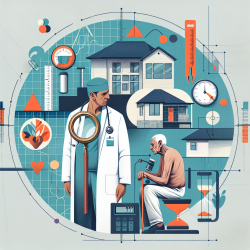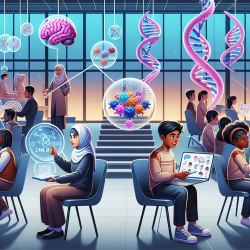Introduction: Unveiling Bias in Healthcare
In the realm of healthcare, the presence of bias can significantly impact patient outcomes, particularly for marginalized groups. A recent study titled "Upward Bound Students' Experience with Bias in Healthcare: An Application of Critical Race Theory" sheds light on how students from the Trio Upward Bound program experience bias when seeking healthcare services. This blog post delves into the findings of this study and offers practical insights for practitioners to enhance their skills and foster more equitable healthcare environments.
Key Findings from the Study
The study, conducted by Hilliard et al. (2023), involved a qualitative group discussion with 26 Trio Upward Bound students. The discussion aimed to explore their experiences with bias in healthcare, utilizing Critical Race Theory as a framework. The analysis revealed three prominent themes:
- Communication: Students reported challenges in communication due to language barriers and cultural differences, which often led to misunderstandings and inadequate care.
- Invisibility: Many students felt invisible in healthcare settings, where their concerns were dismissed or overlooked, leading to a sense of mistrust towards healthcare providers.
- Healthcare Rights: A lack of awareness about their healthcare rights further exacerbated the students' negative experiences, contributing to a reluctance to seek care in the future.
Implications for Practitioners
The insights from this study underscore the critical role that healthcare practitioners play in addressing bias and promoting equity. Here are some actionable steps practitioners can take to improve their skills and provide better care:
- Enhance Cultural Competence: Engage in continuous education and training on cultural competence to better understand and respect diverse cultural backgrounds and communication styles.
- Foster Open Communication: Create a welcoming environment where patients feel comfortable expressing their concerns. Active listening and empathy are key to building trust and understanding.
- Educate Patients on Their Rights: Provide clear information about patients' rights and the healthcare services available to them, empowering them to advocate for themselves.
- Implement Critical Race Theory: Utilize Critical Race Theory as a tool to analyze and address systemic biases within healthcare settings, ensuring that policies and practices are equitable for all patients.
Encouraging Further Research
While this study provides valuable insights, it also highlights the need for further research to explore the intersectionality of race, class, and age in healthcare disparities. Practitioners are encouraged to engage in or support research initiatives that aim to uncover and address these complex issues.
Conclusion: Towards Equitable Healthcare
Understanding and addressing bias in healthcare is crucial for creating a more equitable system. By implementing the insights from the Upward Bound students' experiences and utilizing frameworks like Critical Race Theory, practitioners can improve their skills and contribute to better health outcomes for all patients.
To read the original research paper, please follow this link: Upward Bound Students' Experience with Bias in Healthcare: An Application of Critical Race Theory.










